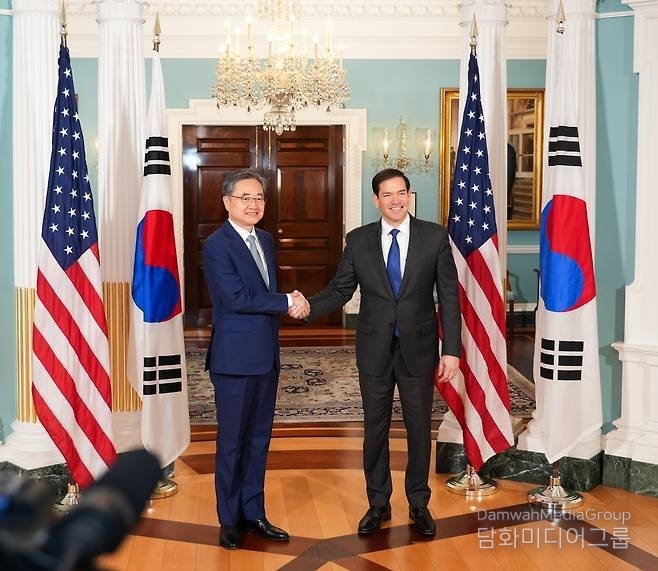By Diplomacy Journal Lee Kap-soo
In their first meeting since the inauguration of the Lee Jae-myung administration, the foreign ministers of South Korea and the United States affirmed their shared goal of North Korea's complete denuclearization and agreed to strengthen trilateral cooperation among South Korea, the United States, and Japan on July 31, 2025 (local time).
They also agreed to further strengthen the ROK-US alliance and modernize it to enhance its strategic importance amidst the changing security environment in the region.

Minister of Foreign Affairs Cho Hyun met with Secretary of State Marco Rubio for the first time since taking office at the State Department in Washington, D.C., and exchanged views on the ROK-US alliance, ROK-US-Japan cooperation, North Korea issues, and regional affairs.
The two ministers "reaffirmed that the ROK-US alliance is a linchpin of peace, stability, and prosperity not only on the Korean Peninsula but also in the region," the Ministry of Foreign Affairs said.
They further stated, "Amidst the changing security and economic environment in the region, both sides agreed to further strengthen the alliance and modernize it to enhance its strategic importance."
The United States is also reportedly pursuing "strategic flexibility," expanding the role of USFK, which previously focused on responding to North Korea's nuclear program, to the Indo-Pacific region, including in response to the Taiwan Strait, as part of its alliance modernization.
Regarding this, a senior government official met with the Washington correspondents and stated, "I believe the role and nature of USFK could change due to various factors."
The two ministers also reaffirmed their shared goal of North Korea's complete denuclearization.
In a press release, the U.S. State Department stated that the two ministers "reaffirmed their unwavering commitment to the complete denuclearization of North Korea and the full implementation of international sanctions and expressed grave concerns about increased military cooperation between North Korea and Russia."
The Ministry of Foreign Affairs also stated that the two sides "agreed to firmly maintain the goal of complete denuclearization of North Korea," adding, "The two ministers shared their mutual assessments of North Korea and agreed to continue close communication and cooperation on North Korean issues going forward."
The two ministers also emphasized that "maintaining peace and stability across the Taiwan Strait has been an essential element of the security and prosperity of the international community," the State Department reported.
The Ministry of Foreign Affairs simply stated that the two ministers "agreed to enhance cooperation between the two countries for peace and stability in the Indo-Pacific region," without directly mentioning the Taiwan issue.
The two countries also agreed that ROK-US-Japan cooperation should continue based on stable ROK-Japan relations.
Minister Cho emphasized his hope to develop a technology alliance based on cooperation in advanced technologies such as artificial intelligence (AI), nuclear energy, and quantum computing as a third pillar of bilateral cooperation, in addition to the two pillars of security and economy that have formed the foundation of the ROK-US alliance.
The Ministry of Foreign Affairs reported that the two ministers "agreed on the need to strengthen cooperation with North Korea and agreed to strengthen the government-wide cooperative system to put this into practice."
The two ministers congratulated the conclusion of the South Korea-U.S. tariff negotiations and coordinated the schedule for the South Korea-U.S. summit, which President Trump announced would be held in Washington within two weeks.
Minister Cho recalled that President Trump had been invited to the Asia-Pacific Economic Cooperation (APEC) summit in Gyeongju in late October and requested the U.S.'s support and cooperation for the successful hosting of the summit. The Ministry of Foreign Affairs reported that Secretary Rubio was fully aware of this and would actively review it.







